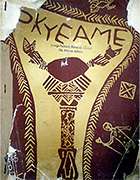Okyeame
 | |
| Editor | Kofi Awoonor |
|---|---|
| Categories | Political magazine |
| Frequency | infrequently |
| Company | Private |
| Country |
|
| Language | English |
| Website | Chimurenga Library |
Okyeame was a literary magazine founded by the Writers Workshop in Ghana in the post-independence era, which saw the rapid rise of a new generation of thinkers, writers and poets. The first of Okyeame issue appeared in 1960.[1] Inspired by Ghana's then Prime Minister, Kwame Nkrumah, the publication sought to explore the experiences of Africa from a new intellectual framework. Writers published in the magazine included its first editor Kofi Awoonor, Efua Sutherland (later also editor), Ayi Kwei Armah and Ama Ata Aidoo.[2]
Background
The publication took its name from a traditional Ghanaian figure, the "spokesperson" or "linguist" responsible for channelling communication between a leader and his people. Okyeame magazine sought to give voice to Kwame Nkrumah's dream of a new African identity. Articles called for a Ghanaian poetry whose content and form was based on oral tradition, drum poetry. These ran alongside traditional oral works translated by leading contemporary poets, such as founding editor Kofi Awoonor, and texts were interspersed with icons and Adinkra symbols. Like its namesake, Okyeame was not simply a mouthpiece; it was also an "interpreter" and an "ambassador in foreign courts". It provided a platform for a new generation of writers to experiment with a versatile, hybrid Pan-African linguistics that combined African oral influences with African-American literary devices; rural with urban imagery; phonetic innovations with lyricism and wordplay; and dirge rhythms with jazz free-play. The Okyeame magazine era is recalled by some scholars such as a time when its writers functioned "like the foot soldiers of Nkrumah in the cultural field".[3]
References
- ↑ "Development of education system in Ghana", The changing face of Africa.
- ↑ Pushpa Naidu Parekh, Siga Fatima Jagne (eds), Postcolonial African Writers: A Bio-bibliographical Critical Sourcebook, Westport CT: Greenwood Press, 1998, pp. 52-53.
- ↑ Kofi Awoonor quoted in Kwame Botwe-Asamoah, Kwame Nkrumah’s Politico-Cultural Thought and Policies, London & New York: Routledge, 2005, p. 55.
This article uses text from chimurengalibrary.co.za under the GFDL